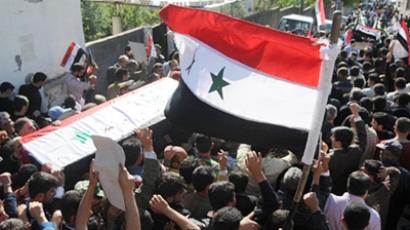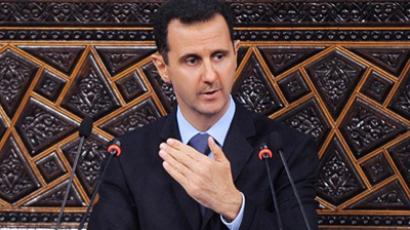The liberation machine has turned against Syria – war correspondent

Another intense day of protest across Syria – dubbed ‘the day of defiance’- has claimed another 30 lives. With the regime conducting deadly crackdowns against its civilians and international pressure building, how long can President Assad hold out?
War correspondent and columnist Eric Margolis believes that President Assad and his government can hold out for as long as the Syrian army and security forces – particularly the elite units – and the business community, which favors stability, stay loyal to him. “But certainly the regime is under tremendous pressure,” he said. “The lid is about to blow off in Syria, it is very hard for [Assad] to release the pressure without creating an explosion. And Syria is also under attack from the outside. So it is going to be a close run thing.”“The biggest obvious pressure is that a religious minority, the Alawi, who are probably no more than between 8 and 13 per cent of the population, have ruled Syria ever since the Assads came to power, because they moved in to the military and the police,” he added. “And the majority of the country, about 80 per cent Sunni Muslims, resented this.”Margolis believes that many Western governments, especially the US government, are quite keen to see the collapse of the Syrian regime.“There is great excitement in Washington at the prospect of overthrowing the Syrian government, it’s been on the front burner in Washington ever since the Bush administration,” he said. “The idea is to deliver a massive blow to Iran’s interests if its ally Syria were to collapse.”“There is also that ‘crusading spirit’ in Europe, as Prime Minister Putin rightly noted,” he added.“They are using humanitarian intervention as a new reason for sending troops in. However, humanitarian intervention usually applies to the places that have resources or strategic geography.”Margolis noted that we are already seeing Western intervention in Syria in action. ”Wikileaks papers have shown that the US has been funding – ever since the Bush administration – armed militant groups in Syria along with Saudi Arabia and Israel,” he says. ”I think the fuse has been lit.”As international pressure grows on Damascus, the EU says it will extend sanctions against Syria next week. The 27-country bloc will impose travel restrictions and freeze the assets of Syrian officials over the violent crackdown on anti-government protests.But the sanctions imposed on Syria so far are rather symbolic, Margolis believes. He thinks that behind the scenes a diplomatic coalition is forming against Syria.“There is pressure and the sense that there is outside funding for some of the Syrian rebel groups,” he said. “It is very nerve-wracking for the Syrians right now. They are quite isolated, and even the Saudis are against them.”So far the US and NATO have not succeeded in Libya, Afghanistan, or Iraq. Margolis believes that they can hardly succeed in places that can fight back, and Syria is one such place.“Syrians have a tough big army. It’s very backward technologically, but going into Syria is going to be no cakewalk for anybody,” he said. “People realize in Europe that the thing could blow up and create another huge mess that could draw in all the neighboring countries. There is discussion and debate going on in Europe, caution but also temptation to get involved.”The Western powers tend to pick countries that have very little power to resist, like Ivory Coast or Libya. Still, Eric Margolis sees Iran as one of Pentagon’s targets for regime change in the long run.“It has been [a target] for a long time. I don’t think it’s an immediate target for American attack as we thought a couple of years ago,” he said. “But there is still pressure, there is funding of anti-regime groups in Iran, broadcasts, etc. So the pressure is there.”














